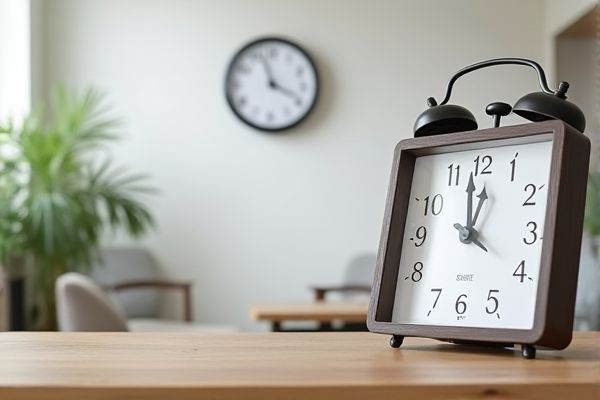
Desk clocks offer portability and easy visibility on your workspace, making them ideal for personal use and close-up time tracking, while wall clocks save space and provide a prominent time display for entire rooms. Discover which clock suits your needs best by exploring their features and benefits in the rest of this article.
Table of Comparison
| Feature | Desk Clock | Wall Clock |
|---|---|---|
| Placement | On desks, tables, or shelves | Mounted on walls |
| Size | Compact, small to medium | Larger, visible from a distance |
| Portability | Portable, easy to move | Fixed position |
| Visibility | Close-range viewing | Room-wide visibility |
| Power Source | Battery or AC powered | Battery or AC powered |
| Design Focus | Functional, decorative for personal space | Decorative, statement piece for room |
| Use Case | Personal time management | General time display in a room |
Desk Clock vs Wall Clock: Key Differences
Desk clocks offer portability and compact design, making them ideal for personal spaces like offices or bedside tables, while wall clocks provide larger displays suitable for room-wide visibility. Desk clocks often include additional features such as alarms and timers, whereas wall clocks primarily serve as decorative timepieces with clear, easy-to-read faces. The choice between desk clock and wall clock depends on space availability, usage purpose, and aesthetic preferences.
Design and Aesthetic Appeal
Desk clocks often feature compact, intricate designs with decorative elements that complement personal or office spaces, making them ideal for close-up viewing and desk organization. Wall clocks, by contrast, prioritize larger faces and bold numerals for visibility from a distance, serving as prominent focal points in room decor. Both types offer diverse styles, from modern minimalist to classic vintage, catering to various interior design preferences and enhancing aesthetic appeal differently.
Space and Placement Considerations
Desk clocks offer versatile placement options on tabletops, shelves, or desks, making them ideal for personal spaces and small areas. Wall clocks save valuable surface space by being mounted vertically, suitable for larger rooms or areas where floor or desk space is limited. Choosing between a desk clock and a wall clock depends on spatial constraints, visibility preferences, and room layout.
Functionality and Features Comparison
Desk clocks provide customizable features such as alarms, temperature displays, and USB charging ports, making them ideal for personal use on your workspace. Wall clocks offer large, easy-to-read faces and often serve as decorative or prominent timepieces in shared areas. Choosing between the two depends on your need for portability and multifunctionality versus visibility and aesthetic impact.
Accuracy and Timekeeping Reliability
Desk clocks often feature high-precision quartz movements that provide superior accuracy and consistent timekeeping, making them ideal for personal use where precision is critical. Wall clocks may vary in accuracy depending on their mechanism, with some models relying on less precise pendulum or mechanical systems that require regular adjustments. Your choice should consider the reliability of the clock's movement and how often you need to check or reset the time for optimal performance.
Suitable Environments for Each Type
Desk clocks are ideal for personal spaces such as offices, study rooms, or bedside tables where you need quick, convenient access to time without occupying wall space. Wall clocks suit larger or communal environments like living rooms, kitchens, classrooms, and offices where visibility from a distance is essential for multiple people. Choosing the right clock enhances your environment's functionality and aesthetic by matching its size and purpose to your specific space.
Maintenance and Durability
Desk clocks typically require more frequent cleaning and battery replacement due to their proximity to dust and handling, while wall clocks are less prone to wear but need secure mounting to avoid damage. Materials like metal or wood enhance durability for both types, with wall clocks generally experiencing less physical impact. Choosing between the two depends on your preference for ease of access versus longevity and maintenance effort.
Price Range and Budget Options
Desk clocks typically offer a wide price range, starting from as low as $10 for basic models to over $200 for premium designs with advanced features. Wall clocks often cover a similar spectrum, though budget-friendly options under $20 are more commonly found due to simpler mechanisms and larger mass production. You can find affordable and stylish choices in both categories that fit your budget without sacrificing functionality or aesthetic appeal.
Popular Styles and Trends
Desk clocks often feature minimalist designs, vintage aesthetics, and smart technology integration, making them popular for modern workspaces. Wall clocks trend towards oversized numerals, industrial materials like metal and wood, and artistic, statement-making designs that serve as focal points in home decor. Your choice depends on whether you want a practical timepiece that complements your desk or a bold, decorative element for your walls.
Choosing the Right Clock for Your Needs
Desk clocks offer portability and close-up visibility, making them ideal for personal workspaces where frequent time checks are needed. Wall clocks conserve desk space and serve as prominent time displays in larger areas like living rooms or offices. Evaluate your room size, viewing distance, and daily routine to choose the most functional clock that suits your lifestyle.
 homyna.com
homyna.com